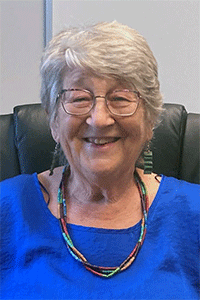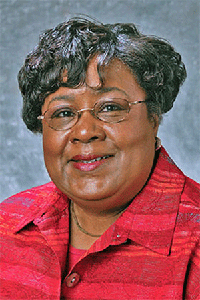Back in the early 1980s, the Rev. Kathy Sage would meet periodically with the handful of women administrators and faculty at United Methodist seminaries and ask them what they needed.

One answer always came back the same, said Sage, who organized the meetings while on staff at the United Methodist Board of Higher Education and Ministry.
Your support of the World Service Fund apportionment supports program-related general agencies, which are especially important to the common vision, mission, and ministry of The United Methodist Church.
“They would say, ‘Kathy, make sure next time to tell the seminaries to send some women of color. We are a very white group. This isn’t right,’” she recalled.
Sage soon discovered that the seminaries had a very good reason for not hiring ordained United Methodist women of color with doctoral degrees. “There weren’t any,” she said.
Sage joined with Angella P. Current-Felder, who oversaw loans and scholarships at the Higher Education and Ministry agency, to change that statistic. Their work led to the agency’s creation of what is now named the Angella P. Current-Felder Women of Color Scholars program.

Since its founding in 1989, the program has celebrated 55 graduates. These scholars are now transforming United Methodist education around the globe, broadening their students’ perspectives and helping pastors reach an increasingly ethnically diverse mission field with the Gospel message.
Here are some of those graduates:
The Rev. Rosetta Ross, Ph.D., one of those graduates and professor of religious studies at Spelman College in Atlanta. She is also an ordained elder in the South Carolina Conference.
The Rev. Yar Donlah Gonway-Gono, Ph.D., the first woman to be president of United Methodist University in Monrovia, Liberia, is a Woman of Color Scholar.
In 1984, the Rev. Karen Y. Collier — the first Black woman ordained in the Tennessee Conference and a fellow United Methodist agency staff member — became the first United Methodist clergywoman of color to earn a Ph.D. Collier — who died earlier in 2023 at the age of 73 — joined Sage and Current-Felder in getting the Women of Color Scholars program off the ground.
The Rev. Linda E. Thomas, Ph.D., who was at the Black clergywomen’s convocation, helped draft the proposal that led to the program's creation.
Wonhee Anne Joh, Ph.D., is helping her students think about what truly decolonizing Christianity might look like. She is the Harry R. Kendall Professor of Christian Theology and Postcolonial Studies at Garrett-Evangelical Theological Seminary in Evanston, Illinois.
The Rev. Traci C. West, Ph.D., in her studies, looked at how the church responds to intimate violence against Black women. In her own ministry as an ordained elder in the New York Conference, she saw the need for more pastoral resources.
The WOC program continues to thrive even at a time when some U.S. politicians and pundits are pushing back against efforts to promote ethnic diversity in any field. Currently nine scholars are receiving scholarships and mentoring through the program, which receives funding through an endowment.
Higher Education and Ministry remains committed to the initiative, said the Rev. Shannon Conklin-Miller, the agency’s connectional relations officer.
The three, Sage, Felder and Collier, knew they were on the right track at the first convocation of United Methodist Black clergywomen in June 1987. There, the gathered clergywomen shared their hopes for creating a pool of scholars to fill the void in U.S. seminaries and theological schools.
Current-Felder, who became Higher Education and Ministry's point person on the program said these women's voices are vital to the denomination's future.
Both Sage and Current-Felder are now retired, and they are excited to see Women of Color Scholars now making their mark in multiple settings and sharing their gifts with new generations.
excerpt from a story by Heather Hahn, assistant news editor, UM News
The World Service Fund provides basic financial support to program-related general agencies, which are especially important to the common vision, mission, and ministry of The United Methodist Church. Through World Service funding, agencies support annual conferences and local congregations in living out God’s mission for the worldwide Church. General agencies also provide essential services and ministries beyond the scope of individual local congregations and annual conferences through services and ministries that are highly focused, flexible, and capable of rapid response.





